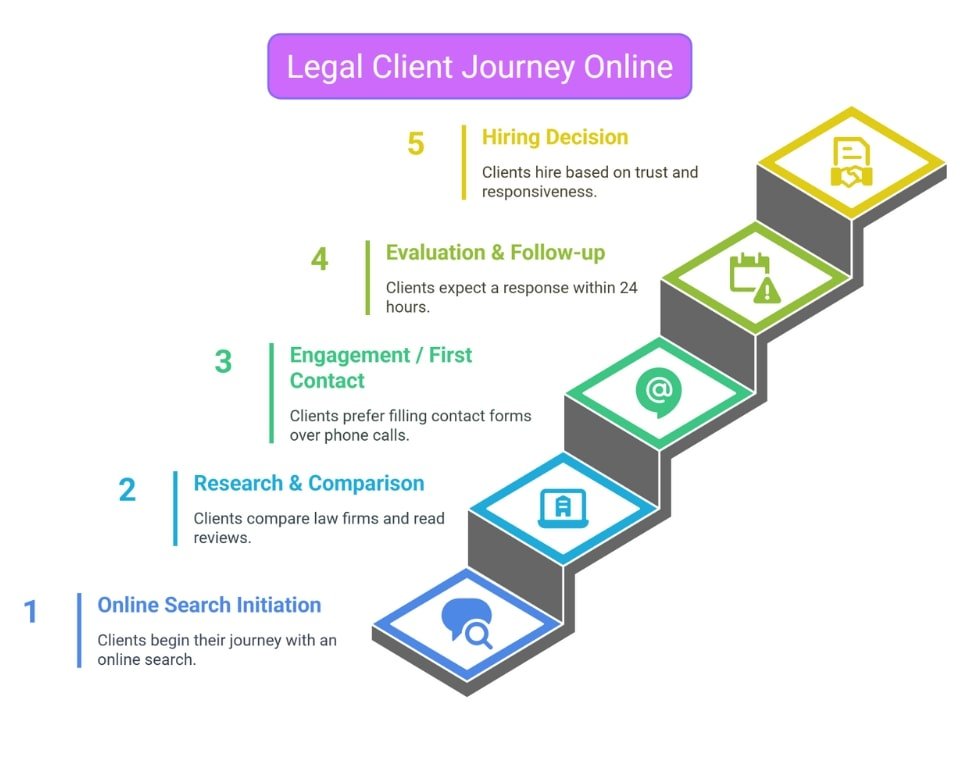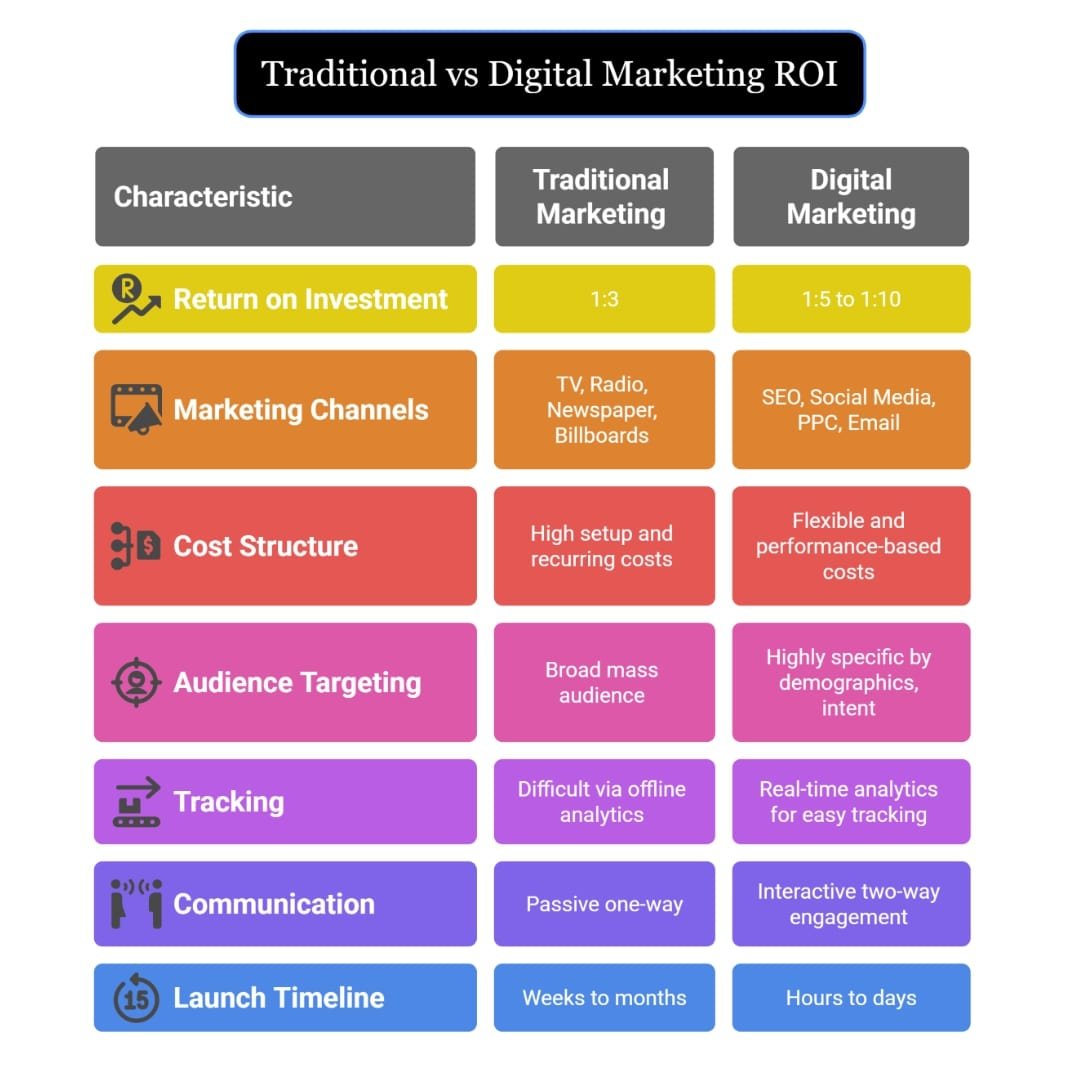Wraps up in 12 Minutes
A solo family law practice in Birmingham went from 2 new clients monthly to 15 qualified enquiries per week—without a single cold call or newspaper advert. Their secret? A strategic digital marketing approach that puts them exactly where potential clients are looking: “online”.
In today's digital-first world, 96% of people seeking legal services begin their search online. Yet many law firms still rely on outdated marketing methods that simply don't reach modern clients. This comprehensive guide reveals the exact digital marketing strategies that successful law firms are using to dominate their local markets and attract high-value clients consistently.
At Wolfable we've helped legal practices across the UK transform their client acquisition through strategic digital marketing. The methods outlined below have generated thousands of qualified leads for our legal clients, and they'll work for your practice too.
What Makes Digital Marketing Essential for Modern Law Firms?
The legal services landscape has fundamentally shifted. Traditional marketing channels like Yellow Pages and newspaper adverts have lost their effectiveness, whilst digital channels now drive the majority of new client acquisitions.
Modern legal clients conduct extensive online research before making contact. They read reviews, compare attorneys, and often make initial contact through websites rather than phone calls. A comprehensive digital presence isn't just beneficial—it's essential for competing in today's market.
Key client behaviour changes include:
- 87% read online reviews before choosing an attorney
- 74% visit law firm websites before making contact
- 63% prefer online contact forms over phone calls
- 78% expect immediate responses to online enquiries

The firms that embrace digital marketing early gain significant competitive advantages, often dominating search results and capturing the majority of qualified leads in their practice areas.
How Digital Marketing Transforms Law Firm Growth
Digital marketing provides law firms with unprecedented targeting precision and measurable results. Unlike traditional advertising, digital strategies allow you to reach specific audiences actively searching for your services whilst tracking every interaction and conversion.
1. Precision Targeting Capabilities
Digital platforms enable targeting based on specific legal needs, geographic location, demographics, and online behaviour. A personal injury firm can target people who've recently searched for "car accident lawyer" within a 20-mile radius, whilst a corporate law practice can reach business owners interested in merger and acquisition services.
This precision eliminates wasted advertising spend on irrelevant audiences whilst maximising exposure to qualified prospects.
2. Measurable Return on Investment
Every digital marketing activity generates trackable data. You can see exactly how many potential clients visit your website, which pages they view, how long they stay, and what actions they take. This transparency enables continuous optimisation and ensures marketing budgets generate measurable returns.
A commercial law firm in Leeds tracked their digital marketing ROI and discovered that SEO-generated leads converted at 43% higher rates than paid advertising leads, enabling them to reallocate budget for maximum impact.
Ready to See How Your Current Digital Presence Measures Up?
Core Digital Marketing Strategies That Drive Legal Client Acquisition
The most successful law firms combine multiple digital strategies to create comprehensive online presence that captures clients at every stage of their research journey.
1. Search Engine Optimisation for Legal Professionals
SEO helps your firm appear prominently when potential clients search for legal services online. Effective legal SEO focuses on both technical optimisation and content strategy that demonstrates expertise whilst answering common client questions.
- Technical Foundation Requirements:
Your website's technical performance directly impacts search rankings and user experience. Search engines prioritise fast-loading, mobile-friendly websites that provide excellent user experiences.
Essential technical elements include website loading speeds under three seconds, mobile-responsive design that works perfectly on all devices, secure HTTPS encryption for client trust, and clean URL structures that search engines can easily understand.
- Content Strategy for Authority Building:
Content marketing establishes your expertise whilst providing valuable information that attracts potential clients. Rather than generic legal content, focus on specific client problems and practical solutions.
Create comprehensive guides for common legal processes in your practice areas. For example, a divorce solicitor might develop detailed guides covering "What to Expect During Divorce Proceedings" or "How to Protect Your Assets During Separation." These resources attract clients early in their research process whilst demonstrating your expertise.
- Local SEO for Geographic Targeting:
Most legal services are location-specific, making local SEO crucial for capturing clients in your service area. Local optimisation helps your firm appear in "near me" searches and Google's local pack results.
2. Performance Marketing for Immediate Results
Pay-per-click advertising delivers instant visibility whilst your SEO efforts build momentum. Legal PPC requires careful keyword selection and compelling ad copy that differentiates your firm from competitors.
- Strategic Keyword Selection:
Focus on high-intent keywords that indicate immediate legal needs. Terms like "divorce lawyer consultation" or "personal injury claim help" suggest prospects ready to hire legal representation. Avoid broad terms like "lawyer" that attract unqualified traffic.
- Landing Page Optimisation:
Create dedicated landing pages for each advertising campaign that directly address the specific legal problem mentioned in your advert. A personal injury ad should lead to a page specifically about personal injury claims, not your general homepage.
3. Social Media Strategy for Professional Services
Social media marketing for law firms requires balancing professional authority with human connection. The goal isn't viral content but rather consistent demonstration of expertise and trustworthiness.
- Platform Selection Strategy:
| Platform | Best For | Content Strategy | Posting Frequency |
|---|---|---|---|
| Professional networking, B2B clients | Industry insights, thought leadership | 3–4 times weekly | |
| Local community engagement | Client stories, firm updates | 2–3 times weekly | |
| YouTube | Educational content | Legal explainers, FAQ videos | Weekly |
| Industry updates | Quick insights, news commentary | Daily |
- Content That Builds Trust:
Share behind-the-scenes content that humanises your practice whilst maintaining professionalism. Client success stories (with permission), team spotlights, and explanations of recent legal developments help potential clients connect with your firm personally.
4. Email Marketing for Client Nurturing
Email marketing maintains relationships with potential clients throughout their decision-making process whilst keeping your firm top-of-mind when legal needs arise.
- Strategic Email Sequences:
Develop automated email sequences that provide value whilst gently encouraging consultation booking. A family law firm might create a divorce guidance series that covers emotional preparation, financial considerations, and legal process expectations.
- Segmentation for Relevance:
Segment your email list based on practice area interest, inquiry stage, and client type. Corporate clients need different information than individuals seeking family law services.

5. Review Generation and Management
Trust is paramount in legal services, making social proof one of your most powerful marketing tools. Potential clients want evidence that you've successfully helped others with similar legal problems.
Online reviews significantly influence hiring decisions, with 87% of potential clients reading reviews before choosing an attorney. Developing a systematic review generation process ensures consistent positive feedback.
- Review Platform Strategy:
| Platform | Importance | Strategy |
|---|---|---|
| Google My Business | Critical for local search | Request reviews post-case completion |
| Trustpilot | Third-party credibility | Automated review invitations |
| Avvo | Legal-specific authority | Professional profile optimisation |
| Community trust | Social engagement and testimonials |
Implement automated review request systems that send personalised invitations to satisfied clients at optimal timing—typically 2-3 weeks after successful case completion when satisfaction is highest.
- Video Testimonials for Emotional Connection
Video testimonials create stronger emotional connections than written reviews. Clients can see and hear real people describing their positive experiences, building trust more effectively than text alone.
A criminal defence solicitor in Liverpool increased consultation bookings by 34% after adding client video testimonials to their website homepage.
- Third-Party Validation
Professional recognition, awards, and media coverage provide additional credibility. Showcase bar association memberships, legal awards, media appearances, and speaking engagements prominently on your website and marketing materials. /p>
6. Voice Search and AI Optimisation for Legal Services
Voice search usage continues growing, with many people using smart speakers and mobile devices to find local services. Optimising for voice search requires understanding how people speak versus type their queries.
- Conversational Keyword Strategy
Voice searches tend to be longer and more conversational than typed searches. Instead of "divorce lawyer Manchester," voice users might ask "Who is the best divorce lawyer near me?" or "How much does divorce cost in Manchester?"
Create content that answers these natural language questions directly and comprehensively. FAQ sections work particularly well for capturing voice search traffic.
- Featured Snippet Optimisation
Many voice search results come from featured snippets—the highlighted boxes that appear at the top of search results. Structure your content to capture these valuable positions by providing clear, concise answers to common questions.
Use numbered lists, bullet points, and step-by-step explanations that search engines can easily extract and display as featured snippets.
7. Marketing Automation for Efficient Growth
Marketing automation enables personalised client experiences at scale whilst reducing manual workload. Automated systems can nurture leads, send relevant content, and trigger actions based on visitor behaviour.
- Lead Scoring and Qualification
Implement lead scoring systems that automatically rank prospects based on their actions and characteristics. Someone who downloads multiple guides, visits pricing pages, and spends significant time on attorney profiles scores higher than casual browsers.
This automation helps prioritise follow-up efforts on the most qualified leads whilst continuing to nurture lower-scoring prospects.
- Behavioural Trigger Campaigns
Set up automated campaigns that respond to specific visitor actions. When someone downloads a divorce guide, they automatically receive a follow-up email series about divorce-related topics. Visitors who view personal injury pages receive information about compensation claims.
Measuring Success: Key Performance Indicators for Legal Marketing
Tracking the right metrics helps you understand which strategies work and where to focus future efforts. Legal marketing success extends beyond website traffic to include lead quality and client acquisition costs.
1. Website and SEO Metrics
Monitor organic search traffic growth, keyword ranking improvements, and conversion rates from visitors to leads. Track which practices area pages generate the most qualified enquiries and optimise accordingly.
Essential tracking includes:
- Organic search traffic by practice area
- Conversion rates from different traffic sources
- Average time spent on key pages
- Contact form completion rates
- Phone call tracking from online sources
2. Lead Generation and Quality Metrics
Measure not just lead quantity but quality. A lead that books a consultation and hires your firm is more valuable than ten leads who never respond to follow-up attempts.
Track lead-to-client conversion rates by traffic source, average client value by acquisition channel, and cost per acquisition across different marketing strategies.
3. Return on Investment Analysis
Calculate ROI for each marketing channel to optimise budget allocation. Digital marketing's measurability enables precise ROI calculation that traditional marketing rarely provides.
A corporate law firm discovered that SEO-generated clients had 3x higher lifetime value than PPC-acquired clients, leading them to increase their content marketing investment.
Common Pitfalls That Limit Law Firm Marketing Success
Understanding frequent mistakes helps law firms avoid costly errors and accelerate their digital marketing success.
1. Mobile Experience Neglect
With over 60% of legal searches occurring on mobile devices, mobile-optimised experiences are essential. Firms that provide poor mobile experiences lose significant potential clients who abandon slow-loading or difficult-to-navigate websites.
Ensure your website loads quickly on mobile networks, displays properly on all screen sizes, and provides easy contact options like click-to-call functionality.
2. Inconsistent Brand Messaging
Mixed messages across different platforms confuse potential clients and weaken brand authority. Develop consistent messaging that clearly communicates your unique value proposition across all digital touchpoints.
3. Review Management Neglect
Many firms generate reviews but fail to respond appropriately or address negative feedback constructively. Active review management demonstrates professionalism and care for client satisfaction.
Future-Proofing Your Legal Marketing Strategy
The digital marketing landscape continues evolving rapidly. Staying ahead of emerging trends ensures your firm remains competitive as client behaviour and technology advance.
1. Artificial Intelligence Integration
AI technology is transforming legal marketing through chatbots for instant client communication, predictive analytics for lead scoring, and automated content optimisation. Early adopters gain competitive advantages whilst providing better client experiences.
2. Video Content Expansion
Video marketing continues growing in importance, with legal professionals using video to explain complex concepts, introduce team members, and build personal connections with potential clients.
Consider developing video content that addresses common client questions, showcases your office environment, and demonstrates your expertise through educational content.
3. Personalisation at Scale
Marketing automation enables increasingly personalised experiences based on visitor behaviour, interests, and legal needs. Personalised content and recommendations improve engagement rates and conversion performance.
Ready to Transform Your Law Firm's Digital Presence?
Digital marketing success requires strategic planning, consistent execution, and continuous optimisation. The firms that commit to comprehensive digital strategies consistently outperform competitors who rely on traditional marketing alone.
At Wolfable, we specialise in developing customised digital marketing strategies for legal professionals. Our approach combines technical expertise with deep understanding of legal industry challenges to deliver measurable results.
The transformation process includes:
- Comprehensive digital audit of your current presence
- Strategic planning based on your practice areas and goals
- Implementation of proven SEO and content marketing strategies
- Performance marketing campaigns for immediate lead generation
- Ongoing optimisation based on performance data
Schedule Your Free Legal Marketing Strategy Session - Get a customised action plan to double your qualified leads in 90 days.







